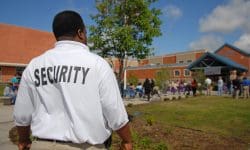Hope for At-Risk Teens
The Los Angeles County Sheriff’s Department’s youth intervention program helps troubled youth turn their lives around.
Read the headlines almost any day, and it’s clear that our nation’s schools are dealing with a lot of troubled youth. From 2002 to 2008, the number of gang members increased by six percent, and the number of gangs increased by 28 percent, according to the Office of Juvenile Justice and Delinquency Prevention. Additionally, the U.S. Department of Education reports that six percent of high school students in 2007 said they had carried a weapon on school property during the previous 30 days.
Statistics like these could discourage even the most optimistic school safety professional, but law enforcement agencies and other organizations across the nation are creating programs that offer assistance for at-risk youth and their parents.
One such program is called Personal Responsibility In Development and Ethics (PRIDE), which was started by the Los Angeles County Sheriff’s Department (LASD) Pico Rivera station in 2008, but is now at the Norwalk Station as well. It is a 10-week faith based intervention program for middle school-aged and high school-aged children who need help getting their lives back on the right track. Teens who are caught associating with gang members, ditching school or tagging, or those who are involved in family disturbances or who are runaways all qualify for PRIDE classes.
“It started as basically a ‘scared straight’ program, and now it’s grown to have parenting components, youth counseling services and community service projects,” says Sgt. Brian Doyle of the LASD’s Norwalk Station. “This continues even after the 10 weeks are over.”
Now, the Norwalk program is in its third year of operation, and is about to begin its fifth class. The Pico Rivera program – which is run by Lt. Steve Sanchez – is also going strong and is starting its eighth class.
Classes Show Consequences of Good and Bad Choices
The first half of PRIDE shows the harsh realities that happen when a teen makes poor choices. The classes include a visit to the local jail, feeding the homeless on skid row, a frank discussion of what prison life is really like and even a visit to a mortuary.
The second half highlights the positive consequences of making good decisions. Field trips include visits to a local college and army base, as well as a right of passage hike.
Mentors play an important role in the program: ideally, one mentor is assigned to two teens. Class sizes range from 15-25, and lunch is normally served after every session to give mentors a chance to bond with the kids.
Parents also get involved in PRIDE. Mothers and/or fathers must attend six sessions on how they can develop their parenting skills and effectively communicate with their children. They must also ensure their teens attend two tutoring classes per week and are available to spend time with PRIDE mentors.
Teens Learn to Appreciate PRIDE, Mentors and Police
Although most PRIDE participants are initially resistant to the process, according to Doyle, by the end of the 10-week classes, most of them change their minds.
“I remember the first class I did, when I stood in front of these kids, they were leaning back saying, ‘Who’s this fool?’” he says. “By the end of the class, they are coming up and hugging me. I still hear from them today. The kids are starving for the attention and something to do when they get out of school. I’ve had kids who have graduated from the program, and they call me a month later and want to join my next class.”
Some of the PRIDE graduates do return to the program as junior mentors to assist with the new class of teens. Additionally, even after the 10-week program is over, Doyle and the mentors keep in touch with the participants to check on their progress and intervene when appropriate.
So does PRIDE actually work? Although Doyle has not been able to quantify the program’s achievements, he estimates the success rate is more than 50 percent. But even if it is much less than that, Doyle believes PRIDE is worth the effort.
“If you’ve reached one out of the 20 kids, you’ve done your job.”
For more information on PRIDE, contact Sgt. Doyle at bpdoyle@lasd.org or (562) 466-5455 or Lt. Sanchez ssanche@lasd.org or (562) 949-2421 ext. 4335.
Resources:
- PRIDE Referral Form
- PRIDE Parent Introduction Letter
- PRIDE Parent Assignments
- PRIDE Student Contract
Related Articles:
- View the slideshow
- Gang Prevention 101: A School Approach
- Marcos’ Story
- Kyli’s Story
- How to Start Your Own Youth Intervention Program
- Interpreting Graffiti: What the Writing on the Wall Can Tell You
If you appreciated this article and want to receive more valuable industry content like this, click here to sign up for our FREE digital newsletters!
 Leading in Turbulent Times: Effective Campus Public Safety Leadership for the 21st Century
Leading in Turbulent Times: Effective Campus Public Safety Leadership for the 21st Century
This new webcast will discuss how campus public safety leaders can effectively incorporate Clery Act, Title IX, customer service, “helicopter” parents, emergency notification, town-gown relationships, brand management, Greek Life, student recruitment, faculty, and more into their roles and develop the necessary skills to successfully lead their departments. Register today to attend this free webcast!














